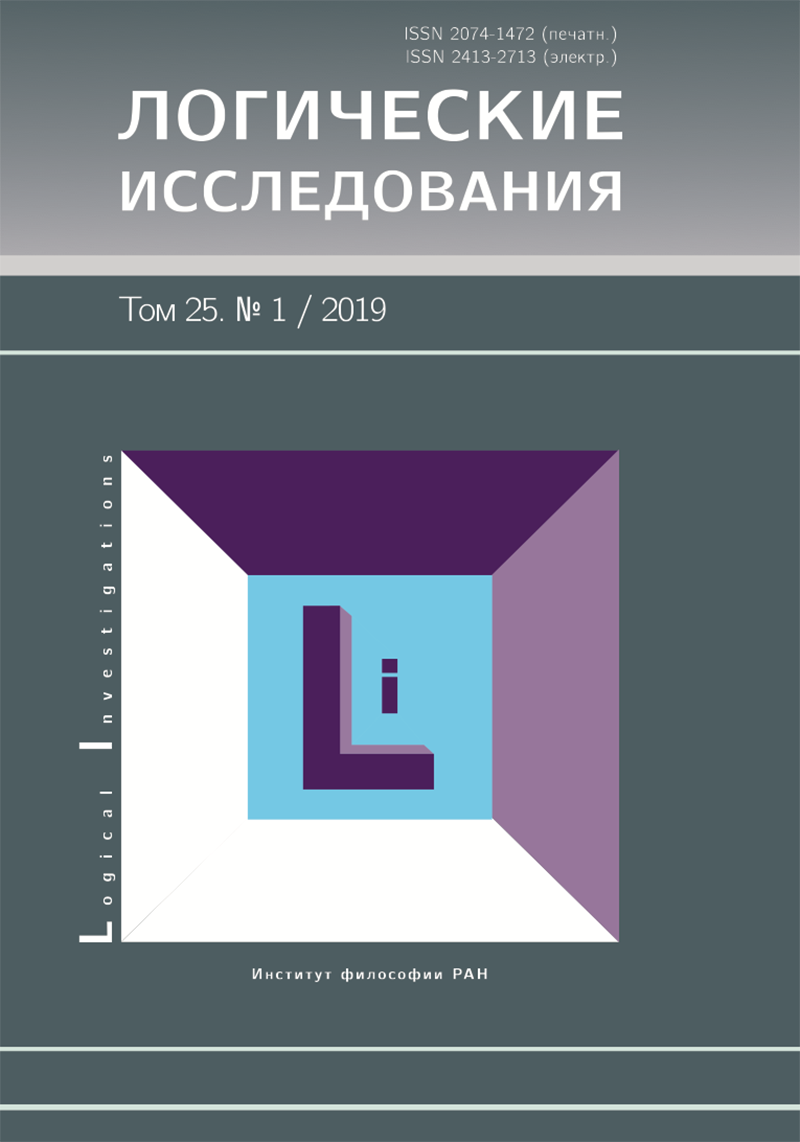The riddle of paradeigma
##plugins.themes.bootstrap3.article.main##
Abstract
The article continues the study of paradeigma (parallel reasoning, reasoning based on an example). Paradeigma was considered in detail by Aristotle in Prior Analytics, and in a rhetorical manner – in "Rhetoric" as being one of the two modes of argument. In previous papers, the emphasis was made on cognitive-epistemological interpretation of corresponding cognitive procedure. This paper zeros on the logical characteristics of paradeigma. The first section contains the analysis of the relevant fragments of the Aristotle's text and brief summary of the cognitive-phenomenological interpretation of paradeigma. The aim of the next section was to identify the logical form of reasoning based on an example. It is shown to be non-reducible to other types of plausible (non-deductive) reasoning, such as inductive generalization, analogy and abduction. On this basis, a reasonable assumption is made that pradaeigma is a special independent kind of plausible reasoning. In the final part of the article, the place of the paradeigma and the underlying cognitive procedure in the logical and philosophical views of Aristotle is considered. Special attention is paid to the corresponding cognitive procedure of the first principle grasping, as described by Aristotle in the Posterior Analytics.
##plugins.generic.usageStats.downloads##
##plugins.generic.usageStats.noStats##
##plugins.themes.bootstrap3.article.details##
How to Cite
Zaitseva N. V. The riddle of paradeigma // Logicheskie Issledovaniya / Logical Investigations. 2019. VOL. 25. № 1. C. 37-51.
Issue
Section
Philosophy and Logic
References
Аристотель, 1978 – Аристотель. Соч.: в 4 т. Т. 2. М.: Мысль, 1978. 687 с.
Аристотель, 2005 – Аристотель. Риторика. Поэтика. М.: Лабиринт, 2005. 256 c.
Ахманов, 2002 – Ахманов А.С. Логическое учение Аристотеля. 2-е изд., стереотип. М.: Едиториал УРСС, 2002. 316 c.
Бочаров, Маркин, 2013 – Бочаров В.А., Маркин В.И. Силлогистические теории. М.: Directmedia, 2013. 333 c.
Вольф, 2013 – Вольф М.Н. Основания аргументации в раннегреческой философии: аналогия как тип аргументации // Вестник НГУ. Философия. 2013. T. 11. № 2. C. 110–119.
Гуссерль, 1998 – Гуссерль Э. Картезианские размышления. СПб.: Наука: Ювента, 1998. 315 c.
Зайцева, 2018 – Зайцева Н.В. Когнитивно-феноменологическая интерпретация риторического примера // Вестник Томского государственного университета. Философия. Социология. Политология. 2018. № 45. C. 14–24.
Маковельский, 2004 – Маковельский А.О. История логики. Жуковский; М.: Кучково поле, 2004. 480 c.
Смирнов, 2017 – Смирнов А.В. О формализации умозаключения в процессуальной логике. Часть I // Философский журнал. 2017. T. 10. № 4. С. 71–92.
Смирнов, 2018 – Смирнов А.В. О формализации умозаключения в процессуальной логике. Часть II // Философский журнал. 2018. T 11. № 1. C. 5-27. Aliseda, 2017 – Aliseda A. The Logic of Abduction: An Introduction // Springer Handbook of Model-Based Science / Ed. by L. Magnani, T. Bertolotti. Springer Cham., 2017. P. 219–230.
Bartha, 2010 – Bartha P. By parallel reasoning. Oxford University Press, 2010. 356 p. Benoit, 1980 – Benoit W.L. Aristotle’s example: The rhetorical induction // Quarterly Journal of Speech. 1980. Vol. 66. No. 2. P. 182–192.
Contreras, 2015 – Contreras A.R. Analogy and Isomorphism: Philosophy, Mathemafics and Space // 1st World Congree on Analogy. Puebla, Mexico. 2015. 62 p. Gabbay, Woods, 2006 – Gabbay D., Woods J. Advice on abductive logic // Logic Journal of IGPL. 2006. Vol. 14. No. 2. P. 189–219.
Kennedy, 1991 – Kennedy G.A. (trans./ed.). Aristotle ’On Rhetoric’: A Theory of Civic Discourse. New York/Oxford: Oxford University Press, 1991. 337 p. McCormic, 2014 – McCormick S. Argument by comparison: An ancient typology // Rhetorica: A Journal of the History of Rhetoric. 2014. Vol. 32. No. 2. P. 148–164.
Rahman, Iqbal, 2018 – Rahman S., Iqbal M..Unfolding Parallel reasoning in islamic jurisprudence: Epistemic and Dialectical Meaning in Abu Ishaq al-Shirazi’s System of Co-Relational Inferences of the Occasioning Factor // Arabic Sciences and Philosophy. Vol. 28. No. 1. P. 67–132.
Аристотель, 2005 – Аристотель. Риторика. Поэтика. М.: Лабиринт, 2005. 256 c.
Ахманов, 2002 – Ахманов А.С. Логическое учение Аристотеля. 2-е изд., стереотип. М.: Едиториал УРСС, 2002. 316 c.
Бочаров, Маркин, 2013 – Бочаров В.А., Маркин В.И. Силлогистические теории. М.: Directmedia, 2013. 333 c.
Вольф, 2013 – Вольф М.Н. Основания аргументации в раннегреческой философии: аналогия как тип аргументации // Вестник НГУ. Философия. 2013. T. 11. № 2. C. 110–119.
Гуссерль, 1998 – Гуссерль Э. Картезианские размышления. СПб.: Наука: Ювента, 1998. 315 c.
Зайцева, 2018 – Зайцева Н.В. Когнитивно-феноменологическая интерпретация риторического примера // Вестник Томского государственного университета. Философия. Социология. Политология. 2018. № 45. C. 14–24.
Маковельский, 2004 – Маковельский А.О. История логики. Жуковский; М.: Кучково поле, 2004. 480 c.
Смирнов, 2017 – Смирнов А.В. О формализации умозаключения в процессуальной логике. Часть I // Философский журнал. 2017. T. 10. № 4. С. 71–92.
Смирнов, 2018 – Смирнов А.В. О формализации умозаключения в процессуальной логике. Часть II // Философский журнал. 2018. T 11. № 1. C. 5-27. Aliseda, 2017 – Aliseda A. The Logic of Abduction: An Introduction // Springer Handbook of Model-Based Science / Ed. by L. Magnani, T. Bertolotti. Springer Cham., 2017. P. 219–230.
Bartha, 2010 – Bartha P. By parallel reasoning. Oxford University Press, 2010. 356 p. Benoit, 1980 – Benoit W.L. Aristotle’s example: The rhetorical induction // Quarterly Journal of Speech. 1980. Vol. 66. No. 2. P. 182–192.
Contreras, 2015 – Contreras A.R. Analogy and Isomorphism: Philosophy, Mathemafics and Space // 1st World Congree on Analogy. Puebla, Mexico. 2015. 62 p. Gabbay, Woods, 2006 – Gabbay D., Woods J. Advice on abductive logic // Logic Journal of IGPL. 2006. Vol. 14. No. 2. P. 189–219.
Kennedy, 1991 – Kennedy G.A. (trans./ed.). Aristotle ’On Rhetoric’: A Theory of Civic Discourse. New York/Oxford: Oxford University Press, 1991. 337 p. McCormic, 2014 – McCormick S. Argument by comparison: An ancient typology // Rhetorica: A Journal of the History of Rhetoric. 2014. Vol. 32. No. 2. P. 148–164.
Rahman, Iqbal, 2018 – Rahman S., Iqbal M..Unfolding Parallel reasoning in islamic jurisprudence: Epistemic and Dialectical Meaning in Abu Ishaq al-Shirazi’s System of Co-Relational Inferences of the Occasioning Factor // Arabic Sciences and Philosophy. Vol. 28. No. 1. P. 67–132.
